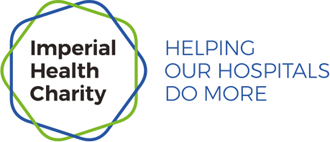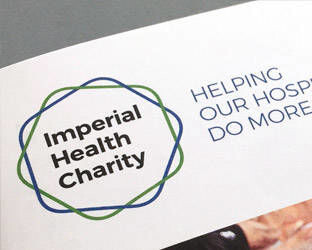
Our arts engagement programme: looking beyond the hospital walls
09 February 2021
After suspending the programme in March 2020, it took us several months to find ways in which our projects could work remotely. Having depended so heavily on human interaction, meeting people on the wards and having a physical presence in our hospitals, we had to retreat to using email as our main form of contact.
With the support of our hospital colleagues and arts facilitators, we were able to trial different ways of delivering art activities remotely until we found ways of working that were sustainable, enabling us to deliver moments of relief and creativity to our patient and staff groups.
Along with Zoom sessions, we also created other remote content, such as recorded video workshops; written step-by-step activity guides; e-magazines; commissioning activity and art books for those staying on wards, and wellbeing postcards for those living in the community.
Across all our activities, we try to put hospital staff at the centre - collaborating with them to produce projects that lead to positive impacts for their patients. Now more than ever, our projects are largely staff-led and our pre-existing relationships with hospital colleagues have been essential to keep our programme going.
During the pandemic, NHS staff have become particularly creative and flexible when thinking about arts projects, and have been willing to try new things. With the absence of visitors at the hospitals, creative distraction and engagement have become more important than ever.
"During the pandemic, staff have become particularly creative and flexible when thinking about arts projects, and have been willing to try new things."
Kate Pleydell and Megan Bastable
In particular, working with patients on Zoom has been a learning curve for us all. The staff on the ward and our facilitators must work together to find the right types of activity at the right time to suit particular groups of patients or staff, which is often a creative challenge as well as an organisational one.
In the background, we're creating new evaluation methods, setting up Zoom sessions, sourcing materials, helping keep people in contact with one another, creating and finding new projects and even acting as tech and safeguarding support within the digital framework.
Here are just a few examples of the arts activities we've delivered during the pandemic.
Melodies and Massage
For the last two years, we've worked with Music in Hospitals and Care (MiHC) to bring wonderful live music to our hospitals' youngest patients in neo-natal intensive care. These Lullaby Hour visits offer patients and families a unique moment to enjoy a live lullaby performed by a professional musician. The programme, delivered four times a month, had become firmly rooted in the weekly routine for these wards.
After being suspended for several months due to the Covid-19 restrictions, occupational therapist Emily Hills approached us with an idea to restart the programme in a different way. The project would now engage with recently discharged families, combining the lullaby session with a baby massage class. By combining the two, the project had a broader appeal and offered an opportunity which many people were missing as baby groups were suspended.
The first four week course of Massage and Melodies worked with six families, with parents reporting a very positive experience, particularly enjoying the opportunity to meet other parents with similar experiences. The project is now in its second phase, working with nine families.
"A hospital community stretches far past its walls, and our programme should reflect this."
Kate Pleydell and Megan Bastable
Looking beyond the hospital walls
The majority of our work is focused on activities within our hospitals, particularly on inpatient wards. But over the past few years, we've been developing our programme to engage more with outpatients.
With integrated care models coming more and more into focus, it's becoming widely recognised that a hospital community stretches far beyond its physical walls - and we feel our programme should reflect this.
We felt this was especially important during the pandemic, as the hospitals' outpatient communities include some of the most vulnerable to Covid-19, and consequently the most isolated. As a result, we’ve initiated two projects which we hope will combat these problems.
In Touch
In Touch is a new project led by our poet in residence Keith Jarrett. The residency was developed alongside conversations about digital accessibility as we recognised that a large percentage of our service users may have limited access to digital resources and events. We also wanted an appropriate space for people to be able to work through issues around the pandemic, such as feelings of isolation.
During the residency, Keith will work across our hospitals, with patients and staff on and off site. As part of the project, Keith will develop an activity book which will be posted to collaborators, encouraging them to send back a poem to be included in an anthology. Their poem will then be sent on to another participant, putting them ‘in touch’.
You can listen to Keith's latest poem, written with an elderly care patient, here.
Positive Post
Another project we’re very excited to be working on is Positive Post. This project was initiated by renal support worker Michelle Delon, who felt that patients supported by the renal department would benefit from a delivery of four positive and uplifting postcards, reminding them of the support available and positive activities they can do every day.
We worked with illustrator Erin Aniker to create a set of beautiful images, which will be sent to 10,000 clinically vulnerable patients early this year.
Creative support for staff
With the move towards technology, we've been able to not only support patients but also our incredible NHS staff. Thanks to the flexibility of online workshops, we can now run evening art workshops that staff can tune in to from the comfort of their own homes with a cup of tea or a glass of wine in hand.
Staff art workshops run by our partners Paper Birch have been well attended and we've received fantastic feedback from participants. We've also had similar comments about the virtual events organised by our partner museums, which staff can access through our Staff Arts Club.
The virtual events from the Royal Academy of Arts on offer to us are short, engaging and completely remote - meaning staff can join from anywhere, including the hospital itself. It’s been rewarding to witness how technology can bring art to our staff wherever they may be.
Discover Creative Links, our new digital programme, here.

